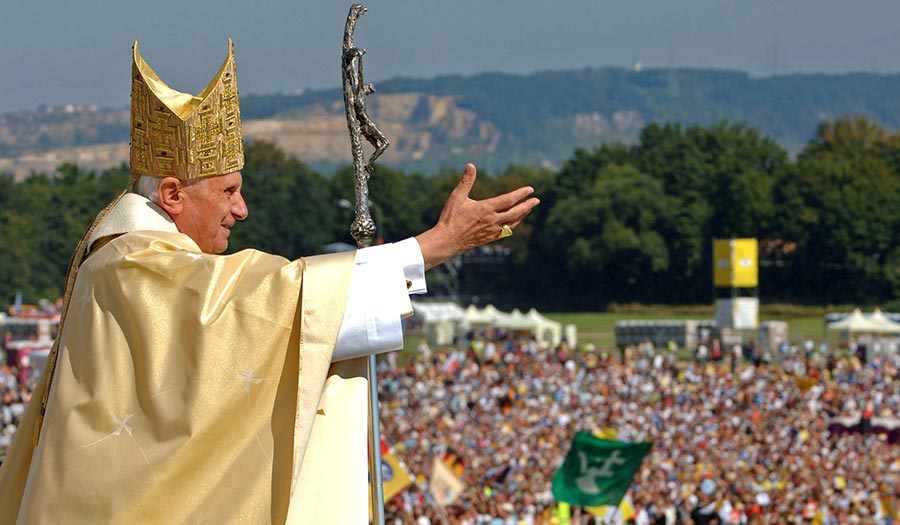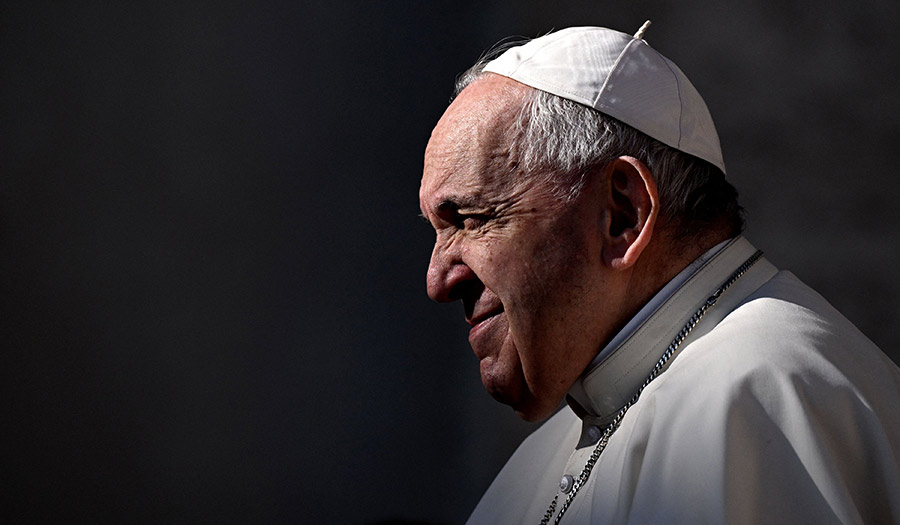 AP/Wolfgang Radke
AP/Wolfgang Radke
World News Desk
Learn the why behind the headlines.
Subscribe to the Real Truth for FREE news and analysis.
Subscribe NowBERLIN (AP) – Pope Benedict XVI leaves his homeland with a complicated legacy: pride in a German pontiff but a church deeply divided over the need for reforms in the wake of a sexual abuse scandal in which his own actions of decades ago were faulted.
Benedict has long drawn mixed reviews in Germany, a country where Christians are roughly evenly split between Catholics and Protestants and where many struggled with his conservative stance.
The day after the then-Cardinal Joseph Ratzinger was elected as the first German pope for centuries in 2005, best-selling newspaper Bild’s front page screamed “We are the Pope!” The left-leaning Tageszeitung countered with the headline “Oh, my God!”
Chancellor Olaf Scholz said that “as the ‘German’ pope, Benedict XVI was a special church leader for many, not just in this country.” He paid tribute to the late pontiff as “a formative figure of the Catholic Church, a combative personality and a wise theologian.”
“As the church in Germany, we think with gratitude of Pope Benedict XVI: He was born in our country, his homeland was here, and he helped shape church life here as a theological teacher and bishop,” said the head of the German Bishops’ Conference, Limburg Bishop Georg Baetzing.
Still, a decade after his resignation, deep divisions are apparent in the German church between traditionalists in Benedict’s mold and relative liberals.
“The German pope filled many with pride, but above all with hope,” said Irme Stetter-Karp, the head of an influential lay organization, the Central Committee of German Catholics, or ZdK. “For some, this hope was richly fulfilled. For others, there remained an unfulfilled longing to find a way...for their Christianity to succeed in the 21st century.”
Since 2019, German Catholic bishops and representatives from the ZdK have been engaged in a potentially trailblazing reform process—the “Synodal Path”—that is addressing calls to allow blessings for same-sex couples, married priests and the ordination of women as deacons.
German church leaders insist that the process won’t lead to a schism and vow to see it through, even as they face pressure from suspicious Vatican officials.
Illustrating both the pressure for reform and the divisions it faces, a Synodal Path assembly in September failed to approve a text calling for a liberalization of sexual teaching because, while it won 82 percent backing overall, it failed to get the required support of two-thirds of German bishops.
The retired pope himself stayed out of the fray though his longtime secretary, Archbishop Georg Gaenswein, has signaled his own strong skepticism about the Synodal Path.
The process was launched in response to the abuse scandal that has rocked the church in Germany and elsewhere in recent years, something that has contributed to large numbers of Germans formally leaving the church.
In 2018, a church-commissioned report concluded that at least 3,677 people were abused by clergy in Germany between 1946 and 2014. More than half of the victims were 13 or younger, and nearly a third served as altar boys.
Various dioceses tasked law firms or others to put together reports on their own past. That has led to massive and unresolved tensions in the Cologne diocese, where the archbishop, Cardinal Rainer Maria Woelki, drew widespread criticism for his handling of a report he commissioned. His offer of resignation has been pending with Pope Francis for months.
An independent report in the Munich and Freising archdiocese, where Benedict served as archbishop from 1977 to 1982, turned the spotlight on the retired pope himself last January. Its examination of decades of abuse cases faulted their handling by a string of church officials past and present, including the then-Cardinal Ratzinger in four cases.
Benedict asked forgiveness for any “grievous faults” in his handling of clergy sex abuse cases, but denied any personal or specific wrongdoing. Reform advocates and victim support groups criticized what they saw as a tone-deaf response.
The bishops’ conference head, Baetzing, said Saturday that “he asked for forgiveness from those who were affected; still, questions remained open.” But he stressed Benedict’s role in turning around the church’s approach to clergy sexual abuse as head of the Congregation for the Doctrine of the Faith and later as pope.
The pro-reform group We are Church said that Benedict’s response to the abuse report did serious damage to his reputation and was generally critical of him as an “implacable reactionary.”
- Real Truth Magazine Articles
- RELIGION
 Pope Calls Out Traditionalists – The Catholic Culture War Heats Up
Pope Calls Out Traditionalists – The Catholic Culture War Heats Up


